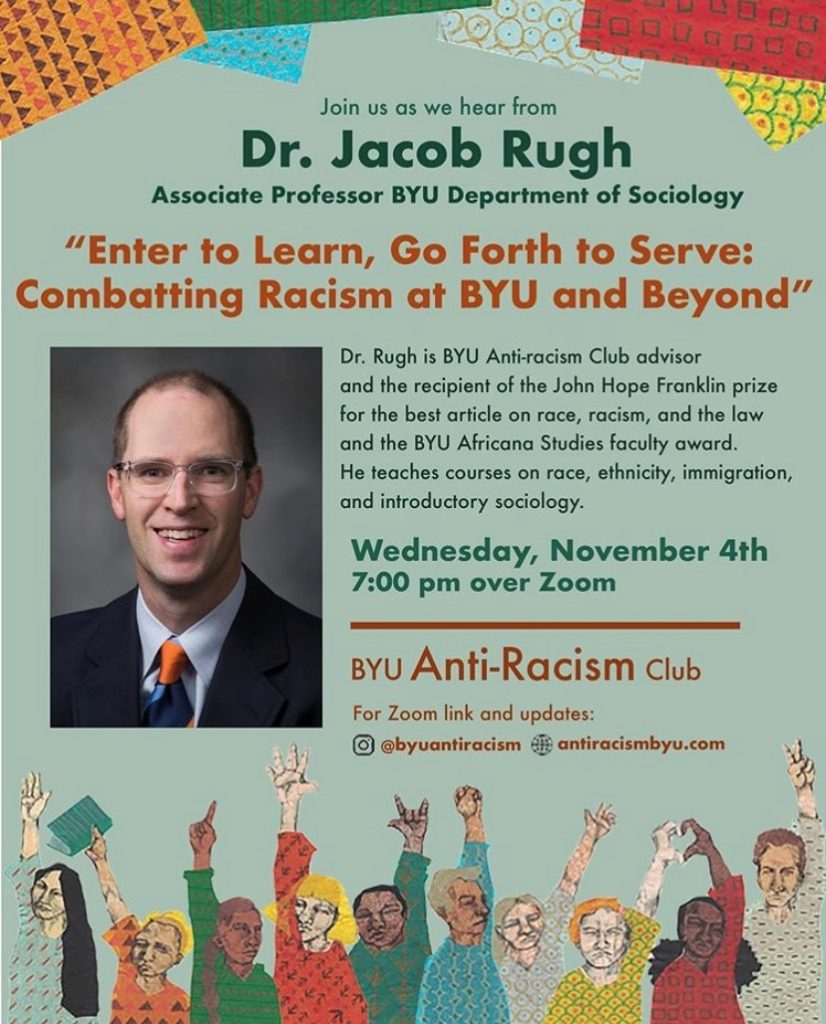The new BYU Anti-Racism Club focuses on combating racism at the university and beyond through education and activism.
The club kicked off this semester following racial unrest over the summer, providing a safe space for students to hear different perspectives and have productive conversations on racism. It holds weekly Zoom meetings with alternating education and activism activities.

The purpose of the Anti-Racism Club is to help everyone better follow Christ’s example to “love thy neighbor” and create a greater spirit of unity and empathy around campus, executive officer Maya Kennedy said.
“It’s hard to love or understand someone you don’t know,” she said. “Thus, our club’s goals are three-part: educate through credible sources, provide opportunities for activism and create an open environment where people can meet each other.”
The club started this year when club president Conner Stevens said he wanted to see what could be done on an individual and community level to fight racism. He was inspired by Martin Luther King’s sermons and the movie “Just Mercy.”
“Everything kind of hit the fan this summer with Ahmaud Arbery, Breonna Taylor and George Floyd,” Stevens said. Floyd’s death was a catalyst that brought to light some of the problems BYU has with racism, he added. He then founded the club with executive officers Maya Kennedy and Michael Rowe.
Executive officer Aisha Lehmann also felt like the university could use an anti-racism club. She emailed BYU sociology professor Jacob Rugh over the summer about starting one, and Rugh told her Stevens, Kennedy and Rowe were already on it. “I reached out to them right away and they let me join their team of officers.”
Additional executive officers Alexandria Byrd and Hanatea Elkington also joined as the school year approached.
“As followers of the gospel of Christ, anti-racism is our responsibility,” Kennedy said. “Christ’s teachings should inspire us to make an increased effort to love all our neighbors, not just the people who are most similar to us.”
To promote anti-racism, students should maintain an open mind and learn to have crucial and often high stakes conversations, she said.
Lehmann said a powerful way students can be anti-racist is by speaking up when their friends, family and peers say inappropriate and racist comments or supposed jokes.
Losa Smith, a senior from Austin, Texas studying sociology, also discussed how students can have productive conversations on race. “BYU students can choose to hear first, listen second and ask clarifying questions third.”
Another way students can be anti-racist is by taking advantage of opportunities on campus to learn about race and racism, Lehmann said. One way to do this is by attending the Anti-Racism Club’s weekly Zoom meetings.
Club members take on a different issue and focus on it for two weeks. The first week is the education portion, where they watch TED Talks and BYU devotionals on topics such as police brutality and mass incarceration, Rowe said.
For example, the club watched Bryan Stevenson’s TED Talk, “We need to talk about an injustice,” one week. Stevenson is a lawyer who founded the Equal Justice Initiative, which advocates for equal treatment in the U.S. justice system. He gave a BYU forum in 2018.
In the TED Talk, Stevenson discussed systemic racism in the justice system, specifically focusing on the death penalty.
The United States has the highest rate of incarceration in the world, Stevenson said. He mentioned the error rate in the death penalty — one out of nine people killed are innocent — and discussed how Black people are disproportionately affected by it.
The death penalty is 11 times more likely to be given if the victim is white than if the victim is Black and 22 times more likely if the defendant is Black and the victim is white, he said.
“Ultimately, you judge the character of a society not by how they treat the rich and the powerful and the privileged but by how they treat the poor, the condemned, the incarcerated,” Stevenson said.
After an education activity, club members like to do something that helps them take action, Rowe said. In this case, they wrote letters to Utah inmates sitting on death row a week after watching Stevenson’s TED Talk.
They split up into groups and asked themselves, “If you were on death row, what would you want to hear?” They didn’t share personal details, but wrote about things they did that day or shared poems they liked, Rowe said.
“We wanted (the letters) to be something that would give compassion and hope to someone else, to humanize their experience,” he said.
Rugh, the club advisor, gave a presentation, “Enter to Learn, Go Forth to Serve: Combatting Racism at BYU and Beyond,” on Wednesday, Nov. 4. He spoke on some of the ways BYU students can be anti-racist.

“We should be anti-racist because we are Christian Latter-day Saints and not in spite of it,” Rugh said.
Rowe expanded on this idea and said being anti-racist is an act of compassion and kindness. “At BYU, we claim to be Christians, and being anti-racist is a great way for us to walk the walk.”
Stevens said Rugh’s statement boils down to not making racism a political issue, but a human issue and a matter of love.
“As you look at Christ’s example, it’s so clear that he didn’t spend time with the theologians or the politicians or the powerful people of the day,” Stevens said. “He really went to the people who needed him most.”
Rugh also said he was looking forward to a new report from the BYU Committee on Race, Equity and Belonging. “This is the beginning, and if we listen to them and their expertise, and be humble and teachable, I think we can make great strides.”
Students can find upcoming club events on Instagram.




